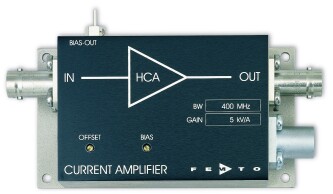- Minimum Input Noise 270 fA/√Hz
- Bandwidth up to 400 MHz
- Gain up to 106 V/A
- Flat frequency response
- Stabilized and Adjustable Bias Voltage Output for Biasing External Photodiodes
- EMI Shielded Case

High Frequency Current Amplifiers – Only for Specialists?
Users of high frequency components are often confronted with problems including unwanted oscillation, poor ground shielding, nonlinearities, gain peaking and bandwidth reduction caused by poorly designed amplifiers. FEMTO High Frequency Amplifiers have been designed to eliminate such unwanted problems. Insensitive to signal source parameters and input wiring, FEMTO High Frequency Amplifiers perform meticulously within their specifications. No gain peaking, oscillation or significant bandwidth reduction will occur, even for source capacitances up to maximum 2 nF (for the HCA-1M-1M-C).
Bandwidth independent of Source Capacitance
Merely a few picofarads of source capacitance can drastically decrease the bandwidth of high frequency current amplifiers. However, FEMTO current amplifiers do not have this limitation and are not influenced by a wide range of source capacitance. No frequency compensation or special adaptation is needed and the bandwidth and gain are constant up to the maximum source capacitance specified for each model*.
“C”-Models
Amplifier models shown with an additional “C” are optimized for handling very large source capacitances up to nanofarads. They are very useful for measuring fast signals down to nanoseconds with large area detectors. For detectors with even more than 2 nF capacitance we offer custom designed models. Please contact us for details.
Adjustable Offset and Bias Voltage
For a high degree of flexibility FEMTO`s HCA Current Amplifiers offer precise offset and bias control by two trimpots. The wide range of the adjustable input offset current compensation preserves full dynamics even for signals with large DC-components. The Voltage at the bias-output can be adjusted precisely from -12 to +12 Volts using the multi turn bias-trimpot.
Applications
Fast Detection with Large Area Photodiodes
Spectroscopy
Photodetection with PMTs and Photodiodes
Ionization Detectors
Pyro- and Piezoelectric Detectors
Variable Gain Current Amplifier Comparison
Current Amplifiers Selector
| Model | 3-dB Bandwidth (DC ...) | Noise Current {/√Hz] | Transimpedance (Gain) [V/A] | Rise/Fall Time | Max. Detector Capacitance |
|---|---|---|---|---|---|
| DHPCA-100 | Variable - see DHPCA-100 product page | ||||
| HCA-1M-1M | 1 MHz | 270 fA | 1x106 | 350 ns | 50 pF |
| HCA-1M-1M-C | 1 MHz | 3.5 pA | 1 x 106 | 350 ns | 2 nF |
| HCA-2M-1M | 2 MHz | 340 fA | 1 x 106 | 180 ns | 25 pF |
| HCA-2M-1M-C | 2 MHz | 3.5 pA | 1 x 106 | 180 ns | 1 nF |
| HCA-4M-500K | 4 MHz | 490 fA | 5 x 105 | 90 ns | 15 pF |
| HCA-4M-500K-C | 4 MHz | 3.5 pA | 5 x 105 | 90 ns | 500 pF |
| HCA-10M-100K | 10 MHz | 1.1 pA | 1 x 105 | 35 ns | 15 pF |
| HCA-10M-100K-C | 10 MHz | 3.5 pA | 1 x 105 | 35 ns | 150 pF |
| HCA-20M-100K-C | 20 MHz | 3.5 pA | 1 x 105 | 18 ns | 50 pF |
| HCA-40M-100K-C | 40 MHz | 3.7 pA | 1 x 105 | 10 ns | 30 pF |
| HCA-100M-50K-C | 100 MHz | 3.8 pA | 5 x 104 | 3.5 ns | 20 pF |
| HCA-200M-20K-C | 200 MHz | 4.9 pA | 2 x 104 | 1.9 ns | 8 pF |
| HCA-400M-5K-C | 400 MHz | 21 pA | 5 x 103 | 1.0 ns | 10 pF* |
| Low Noise Input/Output Cable available: CAB-LN1 Low Noise Cable | |||||
| The maximum detector capacitance listed above means that up to this value the specified bandwidth (± 15 %) is guaranteed. Larger capacitances are also possible but will influence the bandwidth. | |||||
| Output voltage ±1.5 V @ 50 Ohm load. Offset adjustable by trimpot. Output short-circuit protected. Adjustable bias output (-12V...+12V) for biasing photodetectors. Power supply ±15V via 3-pin LEMO socket. A mating connector is provided with the device. Optional power supply PS-15 is available. For further information, please view datasheets. | |||||
| * For the ultra fast models HCA-100M-50K-C, HCA-200M-50K-C and HCA-400M-5K-C a reduction in bandwidth up to 25% of the nominal values might occur if the source capacitance reaches the above noted maximum source capacitance values. Especially for these models short cables at the input and the use of low capacitance sources is of major importance. | |||||
Typical Performance Characteristics

